

Arctic Sea Ice Stops Melting, but Record Low Is Set. Loss of Arctic Sea Ice Could Mean Extreme Weather. Record loss of Arctic ice may trigger extreme weather - latimes.com Icebergs float in a bay off Ammassalik Island, Greenland.
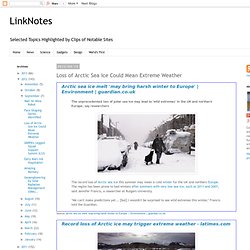
Ice melt could result in extreme weather this winter in North America and Europe, according to climate scientists. (John McConnico / Associated Press) Record loss of Arctic ice may trigger extreme weather. Arctic sea ice is shrinking at a rate much faster than scientists ever predicted and its collapse, due to global warming, may well cause extreme weather this winter in North America and Europe, according to climate scientists.
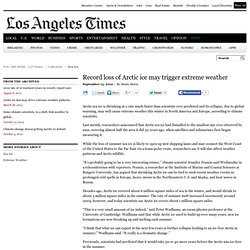
Last month, researchers announced that Arctic sea ice had dwindled to the smallest size ever observed by man, covering almost half the area it did 30 years ago, when satellites and submarines first began measuring it. While the loss of summer sea ice is likely to open up new shipping lanes and may connect the West Coast of the United States to the Far East via a trans-polar route, researchers say it will also affect weather patterns and Arctic wildlife. “It’s probably going to be a very interesting winter,” climate scientist Jennifer Francis said Wednesday in a teleconference with reporters. Arctic Sea Ice Hits Record Low—Extreme Weather to Come? Arctic sea ice is thawing at a historic rate, scientists say.

In fact, a recent analysis of satellite data "utterly obliterates" the previous record, set in 2007. The chief culprit? Global warming. Arctic Ice Melt Could Mean More Extreme Winters For U.S. And Europe. From Climate Central: The record loss of Arctic sea ice this summer will echo throughout the weather patterns affecting the U.S. and Europe this winter, climate scientists said on Wednesday, since added heat in the Arctic influences the jet stream and may make extreme weather and climate events more likely.
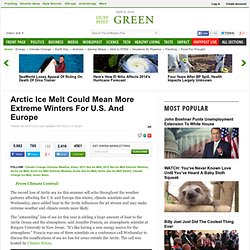
The “astounding” loss of sea ice this year is adding a huge amount of heat to the Arctic Ocean and the atmosphere, said Jennifer Francis, an atmospheric scientist at Rutgers University in New Jersey. “It’s like having a new energy source for the atmosphere.” Arctic ice melt 'like adding 20 years of CO2 emissions' 6 September 2012Last updated at 07:50 ET By Susan Watts Newsnight Science editor, BBC News Watch Susan Watts' full Newsnight film The loss of Arctic ice is massively compounding the effects of greenhouse gas emissions, ice scientist Professor Peter Wadhams has told BBC Newsnight.
White ice reflects more sunlight than open water, acting like a parasol. Melting of white Arctic ice, currently at its lowest level in recent history, is causing more absorption. Prof Wadhams calculates this absorption of the sun's rays is having an effect "the equivalent of about 20 years of additional CO2 being added by man". From Arctic Oscillation to Pineapple Express: A Weather-Maker Patterns Glossary. Arctic Oscillation, Pineapple Express, monsoonal flow, El Niño, Madden-Julian Oscillation—weather and climate patterns with strange-sounding names appear and disappear from the news.
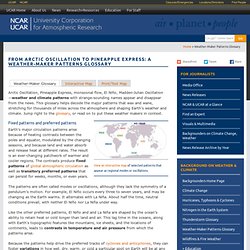
This glossary helps decode the major patterns that wax and wane, stretching for thousands of miles across the atmosphere and shaping Earth's weather and climate. Jump right to the glossary, or read on to put these weather makers in context. Fixed patterns and preferred patterns Earth's major circulation patterns arise because of heating contrasts between the poles and equator, modulated by the changing seasons, and because land and water absorb and release heat at different rates. The result is an ever-changing patchwork of warmer and cooler regions.
The patterns are often called modes or oscillations, although they lack the symmetry of a pendulum's motion. Like the other preferred patterns, El Niño and and La Niña are shaped by the ocean’s ability to retain heat or cold longer than land and air. Back to top. Extreme weather likely as ice loss accelerates - Spokesman.com - Sept. 14. Arctic sea ice is shrinking at a rate much faster than scientists ever predicted and its collapse, due to global warming, may well cause extreme weather this winter in North America and Europe, according to climate scientists.
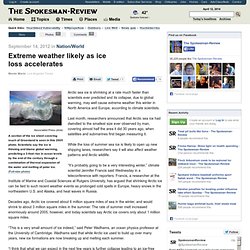
Last month, researchers announced that Arctic sea ice had dwindled to the smallest size ever observed by man, covering almost half the area it did 30 years ago, when satellites and submarines first began measuring it. While the loss of summer sea ice is likely to open up new shipping lanes, researchers say it will also affect weather patterns and Arctic wildlife. “It … You have viewed 20 free articles or blogs allowed within a 30-day period. FREE registration is now required for uninterrupted access. Registration Required log in to your Spokesman.com account for unlimited viewing and commenting access. “It’s probably going to be a very interesting winter,” climate scientist Jennifer Francis said Wednesday in a teleconference with reporters.
Ice loss shifts Arctic cycles. E.
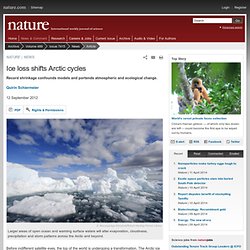
Baccega/age fotostock/Robert Harding Picture Library Larger areas of open ocean and warming surface waters will alter evaporation, cloudiness, precipitation and storm patterns across the Arctic and beyond. Before indifferent satellite eyes, the top of the world is undergoing a transformation. The Arctic ice pack, a primary indicator of climate change, has shrunk in recent weeks to an extent that no computer model and few scientists had thought possible. After five years that all saw less ice than previously documented in the 34-year satellite record, this year’s record loss has scientists questioning their models. The US National Snow and Ice Data Center (NSIDC) in Boulder, Colorado, announced the record decline on 26 August, saying that the ice extent had dropped to 4.10 million square kilometres (see ‘Going, going...’). 'Astonishing' Ice Melt May Lead to More Extreme Winters.
The Jet Stream [720p] Arctic Warming is Altering Weather Patterns, Study Shows. EDITOR'S NOTE: This story was originally published April 3.
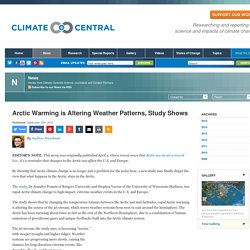
Given recent news that Arctic sea ice set a record low, it's a reminder that changes in the Arctic can affect the U.S. and Europe. By showing that Arctic climate change is no longer just a problem for the polar bear, a new study may finally dispel the view that what happens in the Arctic, stays in the Arctic. The study, by Jennifer Francis of Rutgers University and Stephen Vavrus of the University of Wisconsin-Madison, ties rapid Arctic climate change to high-impact, extreme weather events in the U.S. and Europe. The study shows that by changing the temperature balance between the Arctic and mid-latitudes, rapid Arctic warming is altering the course of the jet stream, which steers weather systems from west to east around the hemisphere. The jet stream, the study says, is becoming “wavier,” with steeper troughs and higher ridges. Arctic Has Lost Enough Ice to Cover Canada and Alaska.
The official end of the Arctic Ocean melt season could come any time now, but the sea ice that covers the North Polar region has already smashed the previous record low for end-of-summer ice area set in 2007.
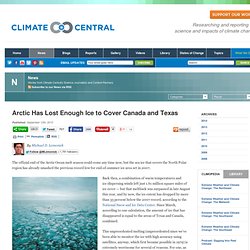
Credit: Alfred Wegener Institute Back then, a combination of warm temperatures and ice-dispersing winds left just 1.61 million square miles of ice cover — but that meltback was surpassed in late August this year, and by now, the ice extent has dropped by more than 35 percent below the 2007 record, according to the National Snow and Ice Data Center. Since March, according to one calculation, the amount of ice that has disappeared is equal to the areas of Texas and Canada, combined. This unprecedented melting (unprecedented since we’ve been able to monitor the ice with high accuracy using satellites, anyway, which first became possible in 1979) is extremely worrisome for several of reasons. Arctic Paradox: Warmer Arctic May Mean Cold Blasts for Some.
PIOMAS Arctic Sea Ice Volume 1979 - 2012 September 2nd. Arctic sea ice melt 'may bring harsh winter to Europe' Unprecedented sea ice loss may bring a cold winter to the UK, say researchers. Photograph: John Giles/PA The record loss of Arctic sea ice this summer may mean a cold winter for the UK and northern Europe. The region has been prone to bad winters after summers with very low sea ice, such as 2011 and 2007, said Jennifer Francis, a researcher at Rutgers University.
"We can't make predictions yet … [but] I wouldn't be surprised to see wild extremes this winter," Francis told the Guardian. Along with the Arctic ice, the rich world's smugness will melt. Greenpeace activists in the Barents Sea who attached themselves to the anchor of a Russian ship taking workers to the country's first Arctic oil production base.
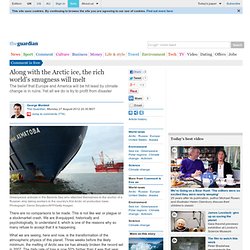
Photograph: Denis Sinyakov/AFP/Getty Images There are no comparisons to be made. This is not like war or plague or a stockmarket crash. We are ill-equipped, historically and psychologically, to understand it, which is one of the reasons why so many refuse to accept that it is happening. David Attenborough: Frozen Planet was not alarmist about climate change. Sir David Attenborough has hit back at claims made by the former chancellor Nigel Lawson that his recent natural history series Frozen Planet promoted climate change "alarmism" and lacked objectivity. Ahead of the final BBC episode in early December, Attenborough wrote a personal plea in the Radio Times warning of the impending dangers of global warming, in which he pointed to scientific evidence that the Arctic is warming twice as fast as the rest of the planet.
The article prompted criticism from Lawson who is a prominent climate sceptic. He wrote in the same issue that "when it comes to global warming [Attenborough] seems to prefer sensation to objectivity" and that "Sir David's alarmism is sheer speculation". Speaking to the Guardian, Attenborough strongly refuted the suggestion that he lacked objectivity: "I am very, very cautious about making sensationalist claims about how disastrous continuing change will be.
Frozen Planet: On Thin Ice – in pictures. Arctic sea ice levels to reach record low within days. North Pole webcam picture taken on 22 August 2012 showing ice cap melting. Climate scientists expect the Arctic sea ice is on course to plummet to its lowest levels ever this weekend. Photograph: University of Washington/ North Pole Environmental Observatory/NOAA Arctic sea ice is set to reach its lowest ever recorded extent as early as this weekend, in "dramatic changes" signalling that man-made global warming is having a major impact on the polar region.
With the melt happening at an unprecedented rate of more than 100,000 sq km a day, and at least a week of further melt expected before ice begins to reform ahead of the northern winter, satellites are expected to confirm the record – currently set in 2007 – within days. "Unless something really unusual happens we will see the record broken in the next few days. "In the last few days it has been losing 100,000 sq km a day, a record in itself for August. "Only 15 years ago I didn't expect to see such dramatic changes – no one did. BBC One - Frozen Planet, Winter. BBC One - Frozen Planet - Clips. BBC One - Frozen Planet - Episode guide. Climate of the Arctic. What causes Arctic amplification? Posted on 2 May 2010 by John Cook. National Snow and Ice Data Center (NSIDC) Polar Science Center » Arctic Sea Ice Volume Anomaly, version 2.